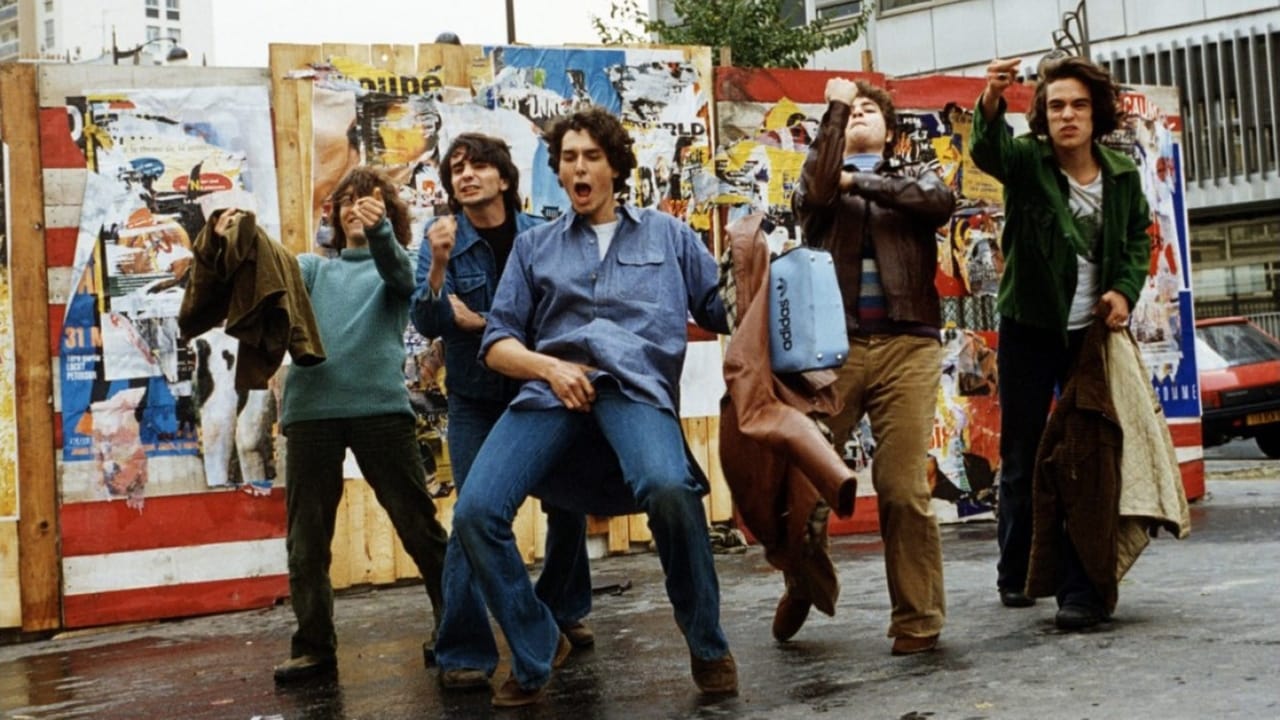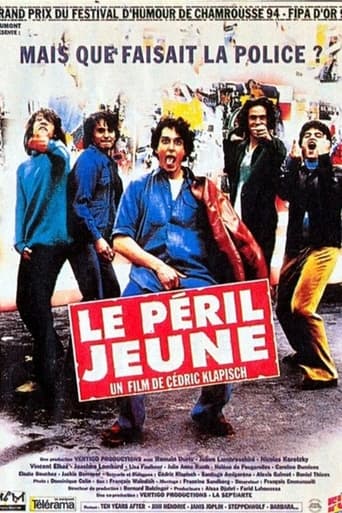

Cinemoi, the satellite French movie channel has been having a number of director Cedric Klapisch films showing on it recently; as well as this, Le Peril Jeune, his later 'Pot Luck' and 'Russian Dolls'.I'd never come across or heard of Klapisch before this spate and it's immediately obvious that he's very comfortable around and capable making and directing young people. There's a naturalness that comes across supremely easily; he is never patronising to either his audience or his actors and he's keen to show all aspects, from the good and happy to really quite dark and bad.Klapisch regular lead man, Romain Duris here plays Tomasi, whose friends gather as their pregnant friend Sophie's about to go into labour at the Paris maternity unit. Minus Tomasi, though as we're already told that he died just one month prior from an overdose and as they wait, they look back over and reminisce all the years when they met at school.We're talking about the 1970s and so all the fashions and music are here. Klapisch always seems to include sex scenes and here we get quite trippy drug-taking, too. All five of our characters were active in some rebellious pursuit or another and in the days of political activism, we see them fight for their causes. There's all the excitable antics of youth; showing off, exploring the opposite sex and much else, including living in a communal squat.Despite this film being almost unknown - look at the number of reviews here and on IMDb - this is a very well made and satisfying film, with a sparkling script. It doesn't take itself too seriously and you can just watch it as it is, without pretence or need of justification. Unlike some French drama, that can be 'charming' there's no room for whimsy here. And, not too exaggerated like many US youth films but believable and thus, satisfying. And because it's another culture to our own, endlessly fascinating, too.
... View MoreI like the way Klapisch brings these characters back together, through the birth of Tomasi and Sophie's baby. It's a great way to recall the memories of youth...waiting for a baby to be born.Tomasi has died and the group is discussing their memories of him, and of a time ten years before when they were carefree kids looking for love, friendship, meaning, in their lives. The vignettes that Klapisch has painted for this movie are full of bittersweet humor and energy. For example, the scenes where they're deciding what party to join, what demonstrations be part of, what organizations to form, trying to get into the feminists group. "If we form a club, we'd let you in". It shows young adults on the brink of adulthood, yet still able to fight the urge for responsibility, at least for a little while. It very much informs the viewer of later Klapisch works like L'auberge Espagnole and Les Poupees Russes. Klapsich is particularly adept at honing in on one character while at the same time the painting the periphery characters with the same multi-dimesional brush.It is both a sad and happy film at the end and very much true to life. There are no grand revelations in the characters, episodes of each of their lives are lived and they've moved on gradually maturing into who they've become. It is a story we can all relate to.
... View MoreBasically, Cédric Klapisch's second long feature movie had known a genesis like "Duel" (1971) by Steven Spielberg. It was to be shot for the television and broadcast on the Franco-German channel: Arte. But it was eventually exploited in the French theaters. This film, partly autobiographic brings out a deep nostalgia through the realist vision on which it focuses. It's the story of a bunch of friends who are gathered for the waiting of Sophie's childbirth and they especially remember their memories when they were in high school: teachers, girls, drugs, demonstrations etc... They were inseparable and motivated by a strong thirst for living.The movie is constructed like a long and vibrant flash-back, momentarily interrupted by sequences of the present moment. To understand the whole movie, let's quote the director's opinion about his work: "the action takes place in 1975, a year of transition between the seventies and the eighties, between a collectivist and individualistic time". If we don't really feel the individualist side, on another hand, the collectivist feeling is very evident. In 1975, society is divided in several faces including 2 significant ones. There are the ones who try to conserve a hippy attitude and the others, aware of the economic problems of their time and decided to fight them, notably through demonstrations where solidarity was a strong asset (rise of unemployment). It is precisely these economic difficulties, at the time considered as not important but which later in the eighties were to rise sharply, making the society enter an individualistic sphere with the evaporation of solidarity. Gérard Jugnot will clearly show it in his film "une époque formidable" (1991). But this transition is also made at the level of the main characters' mentality. They are presented as carefree and rowdy teenagers who will become conscientious grown-ups, the baccalauréat is a sort of frontier between these two worlds.What makes "le péril jeune" so enthralling is that it is mostly filled with dialogs as straight as a die which often cleave through the air revealing Klapisch's great ease with his topic. Sketching his characters with a touch of irony and tenderness, he is supported by a group of young actors all remarkable and we are really under the impression that they fully blossom in their respective roles. I watched a documentary about the film in which the actors have excellent memories about the shooting. Besides, thanks to "le péril jeune", Klapisch made a name for Romain Duris (who was to become Klapisch's favorite actors), Vincent Elbaz and Elodie Bouchez and he contributed in launching their careers in French cinema. In another extent, it would be unfair to neglect the rest of the cast, just outstanding because most of the secondary characters escape from a tempting caricature (the headmaster, the teachers).It is also useful to add that Klpaisch brilliantly uses his camera: to shot sequences of the present moment when the friends are in the hospital, he sticks it in front of them and nearly doesn't move it. Whereas in the long flash-back, his camera is constantly moving. Then, humor is well present throughout the movie but it doesn't stop it from ending on a dramatic note since we learn Tomasi's death due to the drug. Moreover, we leave the projection with a little of melancholy as if disillusions had eventually prevailed over hopes even if the very last shot shows us the four friends running with frenzy in the street.Klapisch moves up a rung in comparison with his previous movie "riens du tout" (1992) and signs here, a movie that enchants us. This joy which treats the eyes is all the more intense as the director's forthcoming movies, "un air de famille" (1996), "l'auberge espagnole" (2002) will be equal to the hopes. At last, "le péril jeune" should revive good old youth memories to the ones who were students in the seventies.
... View MoreFive guys meet ten years after high school and remember good times, reveal little secrets. A journey into their first joints, girls, riots...touching and very funny...a fresh laugh riot with a nostalgic background.
... View More